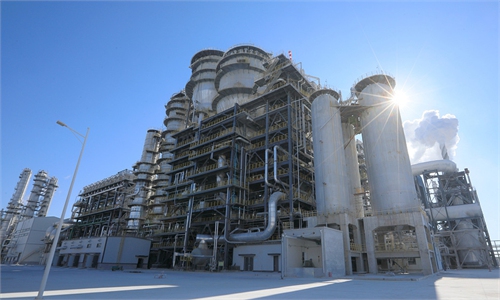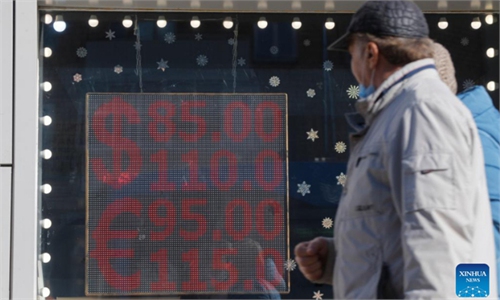Reported Saudi move toward yuan shows payment diversification trend amid US sanctions
Reported Saudi move shows diversification trend

Photo: AFP
As sanctions imposed by the US and some of its allies against Russia continue to rattle the global market, especially global energy trade, more and more countries are seeking alternatives to US dollar-dominated settlement systems to avoid risks and losses, with some exploring the possible use of the Chinese yuan.
The Wall Street Journal reported on Tuesday that Saudi Arabia is in "active talks" with China to price some of its oil sales to China in yuan, citing unidentified sources.
The report came as Indian media outlets also reported that the Indian government was considering buying Russian oil at discounted prices with a rupee-ruble trade mechanism that could use the yuan as a reference currency.
To some, if the Saudi consideration is turned into a reality, it could mean a setback to the petrodollar system, a facet of the US' financial hegemony, and contribute to the decline of the dollar's reserve status, which the US has taken advantage of by printing as many dollars as needed to fund its spending for decades.
Chinese international affairs and oil experts said that although Saudi Arabia and China have been engaged in talks about using the petroyuan for some years, nothing concrete is likely to come out any time soon. But they said that using the yuan to settle some of Saudi's oil trade with China is definitely a trend gaining momentum as it meets Saudi interests, and the yuan is getting increasingly internationalized.
Li Weijian, a research fellow with the Institute of Foreign Policy Studies under the Shanghai Institutes for International Studies, told the Global Times on Wednesday that countries are taking lessons from other countries or from their own bitter experience of the risks of relying entirely on the dollar.
In light of the increasingly frequent abuse of US unilateral sanctions, countries are stepping up their efforts to look for a backup currency for their international trade, and the yuan is one of the options on the table, Li said. With the world's multi-polarization process continuing, the trend will gain momentum and contribute to the internationalization of the yuan.
The yuan's share in global cross-border payments reached 3.2 percent in January, ranking fourth and trailing behind the US dollar, the euro and the pound, per SWIFT data.
China is the world's top oil importer and it buys more than 25 percent of the oil that Saudi Arabia exports.
In recent years, China and Saudi Arabia also engaged in a wide range of cooperation under the Belt and Road Initiative and Saudi Vision 2030.
China's approach of emphasizing development is winning more and more hearts in the Gulf region, Li said. Meanwhile, countries are increasingly seeing through the US' approach of stirring up conflict and then taking advantage.
Settling oil trades in yuan could avoid the negative spillover effects of fluctuations in international crude prices, said Xi Jiarui, a senior crude industry analyst at Beijing-based JLC Network Technology Co, a commodity information provider.
Due to the sheer size of Saudi Arabia's oil exports to China, such a move could have a huge impact, Xi said.
Huge fluctuations in crude prices have been a headache for China, the world's factory, and the effort to stabilize commodity prices has frequently been on the agenda of China's top decision-makers.
Starting in November 2020, Brent oil soared from $40 to $78 per barrel in July 2021. Currently, Brent is trading at around $100 per barrel.
Fan Xinheng, a manager with a state-owned energy firm in East China's Shandong Province in charges of commodity procurement, told the Global Times on Wednesday that he would welcome the day when Saudi oil was settled in yuan.
"Bilateral ties will be forged closer with such a move, and closer ties will help us secure crude oil supplies, which are crucial for us in volatile times," Fan said.
Saudi Arabia exported 84.92 million tons of crude to China in 2021 and secured its status as China's top source of oil imports. Russia came in second.
Countries now being hit with US sanctions have already diversified the currencies they use for payments over the past decade. Analysts nonetheless pointed out that the petroyuan and the yuan's internationalization will be long, arduous processes.
While settlements of oil transactions between China and Saudi Arabia in the yuan are apparently making progress, they may not take place any time soon. There is, however, a growing momentum by countries around the world to find a substitute for the petrodollar system, analysts noted.




